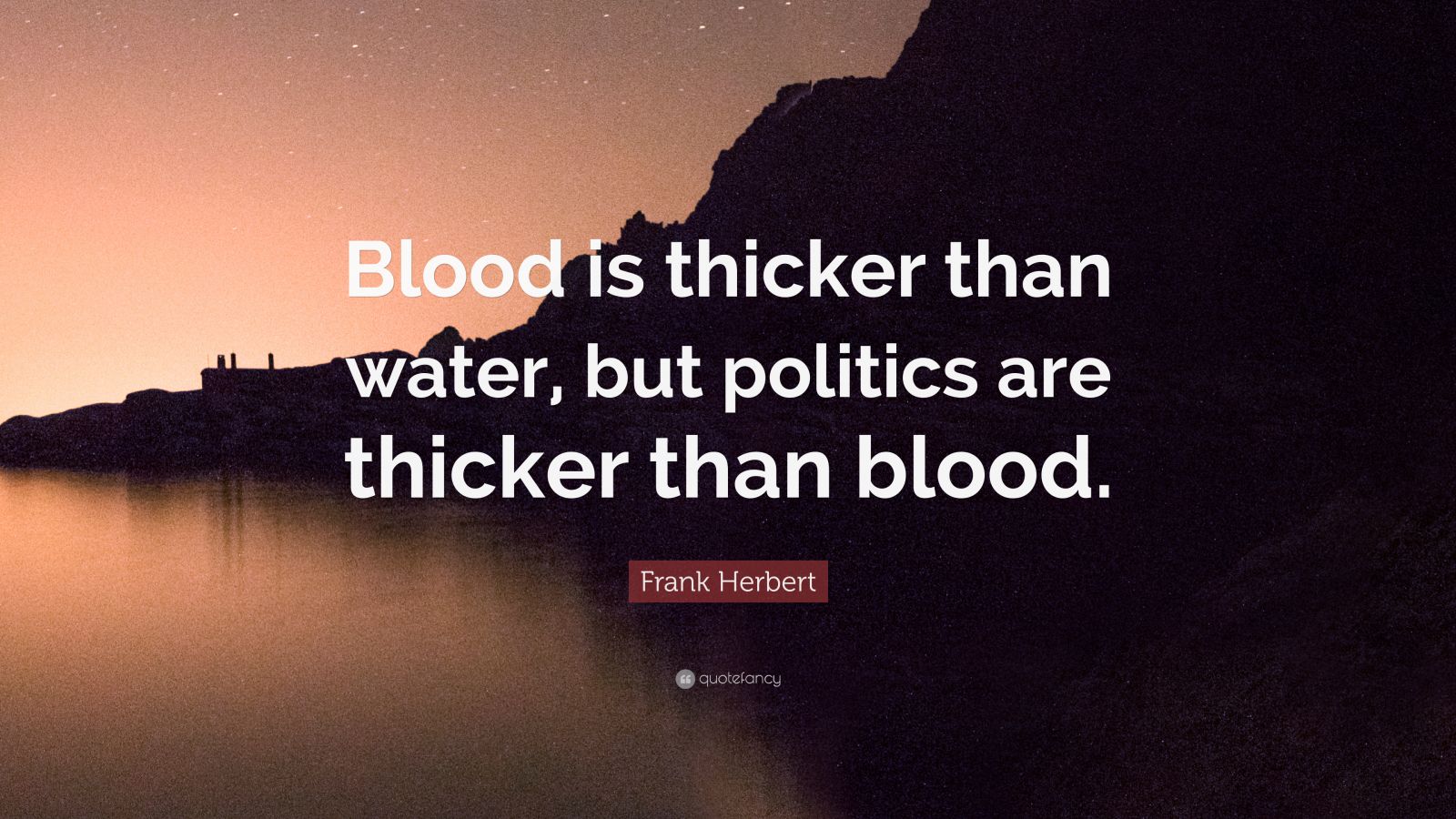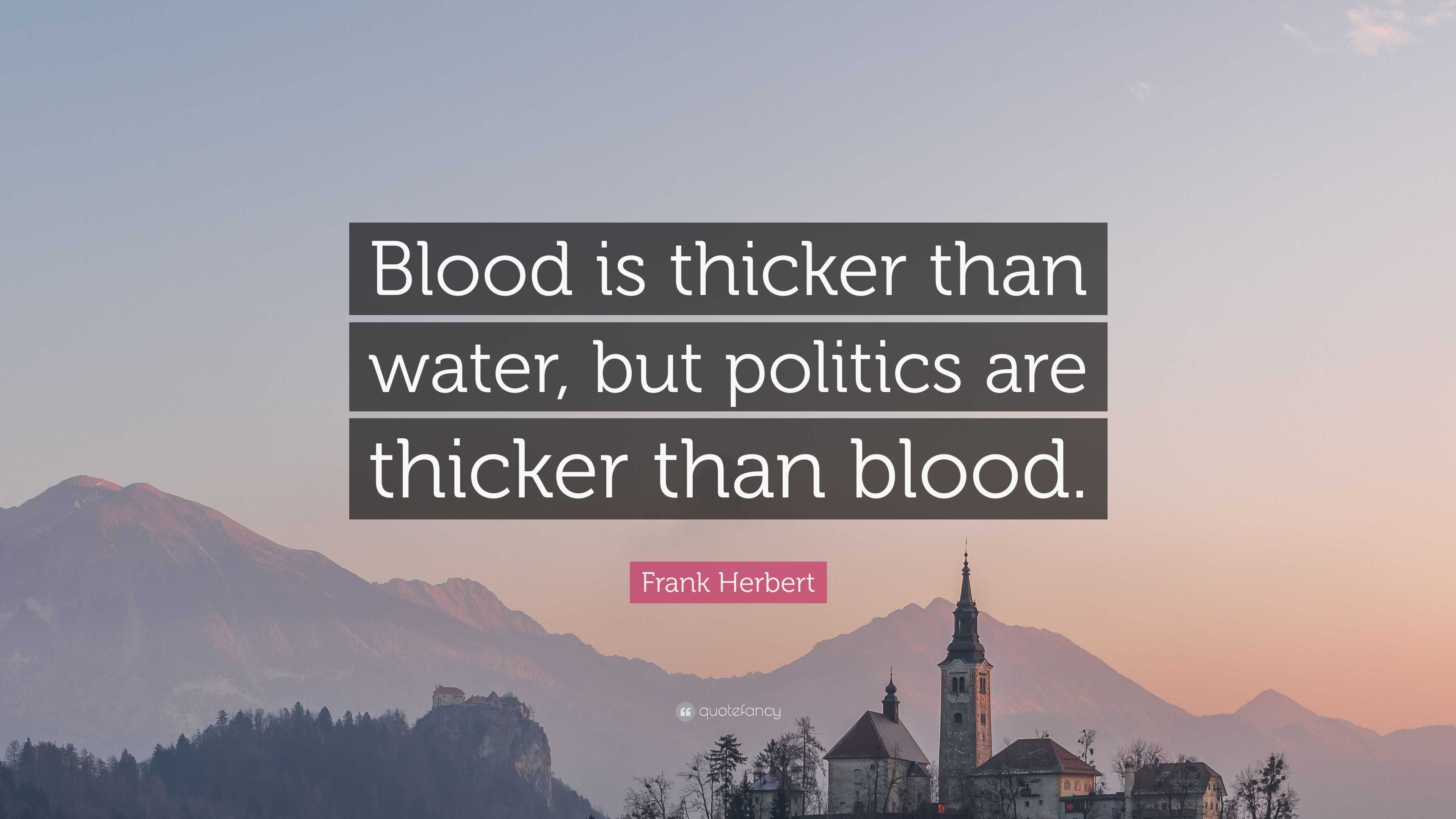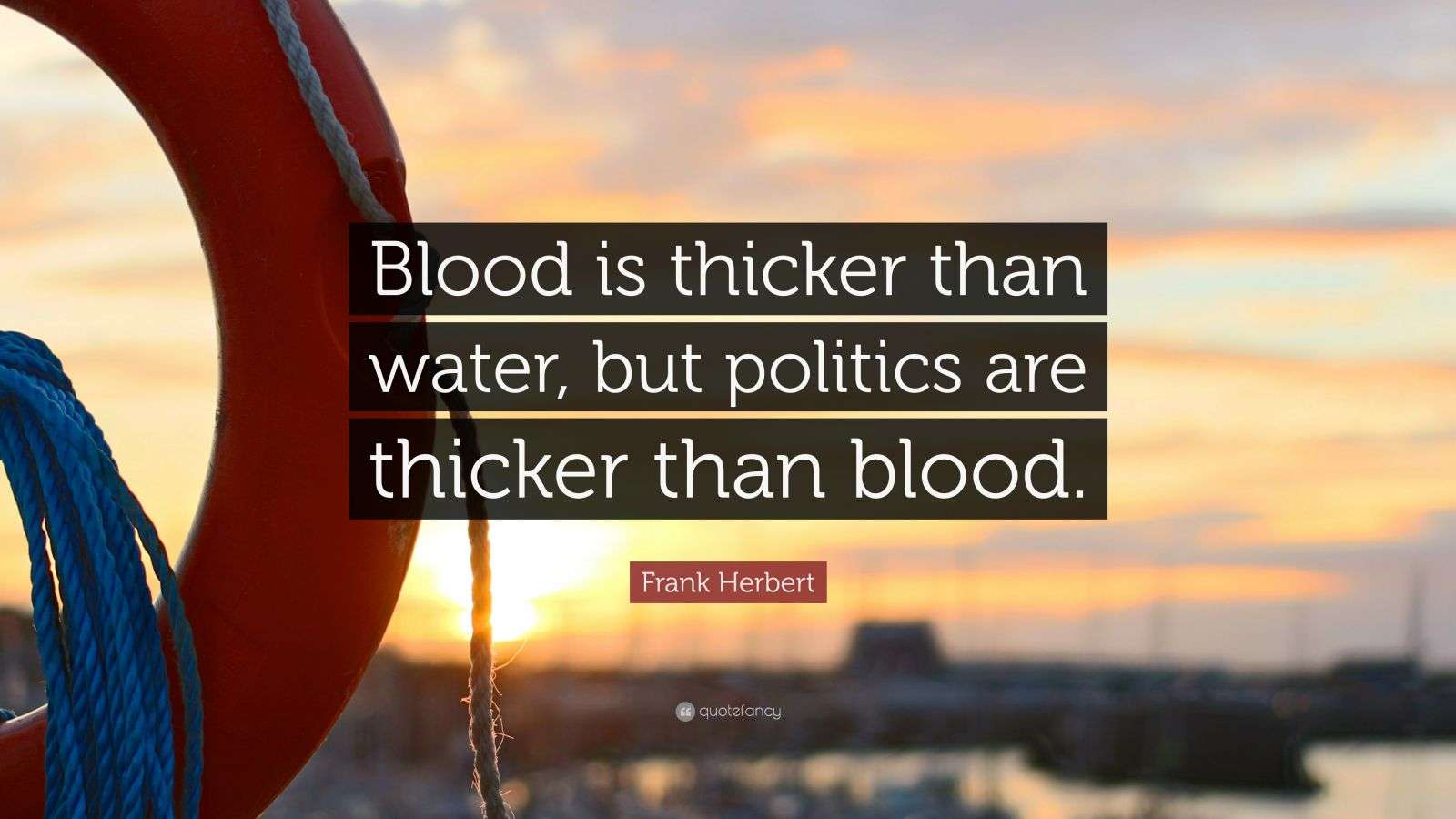Blood Is Thicker Than Water Full Quote: Unpacking The Meaning And Origins
Ever heard the saying "blood is thicker than water"? Well, buckle up because we're diving deep into this famous phrase, exploring its full quote, origins, and what it truly means in today's world. Whether you're here out of curiosity or trying to settle a family debate, this article has got you covered. So, let's get started, shall we?
There's a reason why this saying has stood the test of time. It’s more than just a catchy phrase; it’s a reflection of how we value family bonds. But have you ever wondered where it came from or what the full quote actually is? Stick around, and we'll break it all down for you.
This article isn't just about throwing out random facts. We're diving into the nitty-gritty of "blood is thicker than water," exploring its historical roots, cultural significance, and even how it plays out in modern relationships. So, whether you're a history buff, a language enthusiast, or just someone who loves digging into the deeper meaning of things, you're in the right place.
Read also:Laura Herring The Rising Star Whos Taking Hollywood By Storm
What Does "Blood Is Thicker Than Water" Really Mean?
At first glance, the phrase seems pretty straightforward. It suggests that family ties are stronger and more important than any other relationships. But there's more to it than meets the eye. Let's peel back the layers.
Historically, the saying emphasizes the idea that blood relations—family—should come first. In a world where allegiances can be fickle, this phrase serves as a reminder that family is the one constant we can always rely on. But does that mean we should always prioritize family over friends or partners? That’s where things get interesting.
Origins of the Phrase: A Historical Dive
The phrase "blood is thicker than water" has been around for centuries, but its origins might surprise you. Contrary to popular belief, it didn’t always mean what we think it does today. In fact, the original saying, "the blood of the covenant is thicker than the water of the womb," had a completely different connotation.
Back in the day, this phrase was used to highlight the bonds formed through shared struggles or commitments, like those made in battle or through religious covenants. Over time, the meaning shifted, and the phrase we know today emerged. Cool, right?
The Full Quote: Breaking It Down
Now, let's get to the heart of the matter. The full quote, "the blood of the covenant is thicker than the water of the womb," paints a vivid picture of loyalty and commitment. It suggests that the bonds we form through shared experiences and promises are stronger than even the ties of birth.
But why the shift in meaning? As societies evolved, so did our understanding of family and relationships. Today, the phrase is often used to emphasize the importance of blood relations, but its original meaning reminds us that the connections we choose to make can be just as powerful.
Read also:Superior Ingredients The Secret Behind Unbeatable Flavor And Nutrition
How Has the Meaning Changed Over Time?
Language is a living thing, and phrases like "blood is thicker than water" evolve with the times. In medieval Europe, the saying was all about the strength of oaths and promises. Fast forward to today, and it’s more about family loyalty.
This change reflects how our values have shifted. While family remains a cornerstone of many cultures, we’ve also come to recognize the importance of chosen family—those friends and partners who become like family through the bonds we create. It’s a beautiful evolution that shows just how flexible language can be.
Is Family Always Stronger Than Other Bonds?
Here’s where things get tricky. While the phrase suggests that family ties are unbreakable, real life isn’t always so clear-cut. Sometimes, the bonds we form with friends or partners can be just as strong, if not stronger, than those with family.
Think about it: How many times have you heard someone refer to a close friend as their "chosen family"? Or how about those who find more support and understanding outside their biological family? The reality is, relationships are complex, and no single phrase can capture all their nuances.
Family vs. Chosen Family: Striking a Balance
So, how do we navigate this? The key lies in balance. While family can provide a sense of belonging and security, it’s also important to recognize the value of the relationships we choose. Whether it’s a best friend who’s been there through thick and thin or a partner who truly understands you, these connections deserve just as much respect and care.
Ultimately, it’s about recognizing that all relationships—whether by blood or choice—have their own unique strengths and challenges. By embracing both, we create a richer, more fulfilling life.
Cultural Perspectives on "Blood Is Thicker Than Water"
Let’s take a global view for a moment. Different cultures have different interpretations of family and loyalty, and these perspectives can influence how we understand phrases like "blood is thicker than water."
In some cultures, family is everything. Loyalty to family is seen as a virtue, and the phrase resonates deeply. In others, the emphasis is on individual choice and personal growth, making the idea of chosen family more appealing. It’s fascinating to see how the same phrase can mean different things to different people.
How Does This Phrase Play Out in Modern Society?
Today, we live in a world where family dynamics are more diverse than ever. With blended families, long-distance relationships, and the rise of digital communities, the concept of family has expanded. The phrase "blood is thicker than water" still holds weight, but it’s no longer the only truth.
Many people now see family as a combination of both blood relations and chosen connections. This shift reflects a broader understanding of what it means to be part of a community and how we define our support systems.
Practical Applications: How Can You Use This Knowledge?
Understanding the full quote and its meaning can help you navigate your own relationships. Whether you’re trying to strengthen family ties or build deeper connections with friends, this knowledge can guide you.
- Reflect on your own values: What does family mean to you?
- Communicate openly: Share your thoughts and feelings with loved ones.
- Embrace both blood and chosen family: Recognize the value of all your relationships.
By taking these steps, you can create a more balanced and fulfilling life, one that honors both your roots and your choices.
Real-Life Examples: Stories of Family and Loyalty
Let’s look at some real-life examples to see how this phrase plays out in action. From families who stick together through tough times to friends who become family, these stories highlight the power of connection in all its forms.
Take, for instance, the story of a single mom who finds support in her best friend, who becomes a second mom to her kids. Or the military veteran who forms a lifelong bond with his comrades, seeing them as family. These stories remind us that family isn’t just about blood—it’s about love, trust, and shared experiences.
Common Misconceptions About the Phrase
There are a few myths surrounding "blood is thicker than water" that need addressing. For one, many people assume it means family always comes first, no matter what. But as we’ve seen, the original meaning was more about the strength of oaths and commitments.
Another misconception is that the phrase is outdated. While it may have originated in a different time, its relevance persists. In a world where relationships are more complex than ever, understanding the nuances of this phrase can help us navigate our own lives.
Why Does This Phrase Still Matter Today?
Despite its age, "blood is thicker than water" continues to resonate with people. It speaks to our need for connection and belonging, whether that’s through family, friends, or community. In a fast-paced world where relationships can be fleeting, this phrase reminds us to value the bonds that truly matter.
So, whether you’re trying to strengthen your family ties or build deeper connections with friends, this phrase can serve as a guide. It’s not about choosing one over the other; it’s about recognizing the importance of all your relationships.
Final Thoughts: What Have We Learned?
We’ve journeyed through the history, meaning, and cultural significance of "blood is thicker than water," uncovering its full quote and exploring its relevance today. Here’s a quick recap:
- The phrase originated as "the blood of the covenant is thicker than the water of the womb."
- Its meaning has evolved over time, reflecting changing societal values.
- Family and chosen family both play vital roles in our lives.
As we wrap up, remember this: relationships are what you make of them. Whether you’re strengthening family ties or building new connections, the key is to approach them with love, respect, and understanding.
So, what’s next? Share your thoughts in the comments below. Do you agree with the phrase? How do you define family? Let’s keep the conversation going!
Table of Contents
- What Does "Blood Is Thicker Than Water" Really Mean?
- Origins of the Phrase: A Historical Dive
- The Full Quote: Breaking It Down
- How Has the Meaning Changed Over Time?
- Is Family Always Stronger Than Other Bonds?
- Family vs. Chosen Family: Striking a Balance
- Cultural Perspectives on "Blood Is Thicker Than Water"
- How Does This Phrase Play Out in Modern Society?
- Practical Applications: How Can You Use This Knowledge?
- Real-Life Examples: Stories of Family and Loyalty
- Common Misconceptions About the Phrase
- Why Does This Phrase Still Matter Today?
- Final Thoughts: What Have We Learned?


